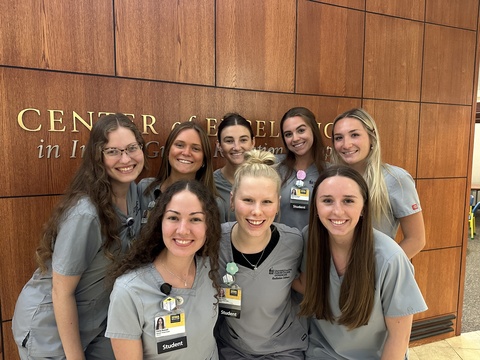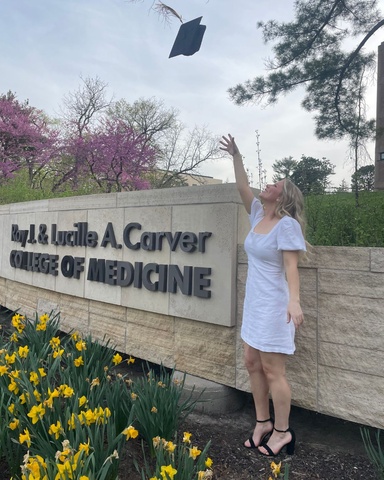
Hometown: Cedar Falls, Iowa
Program: Bachelor of Science in Radiation Sciences, radiation therapy track
How did you become interested in a career in radiation science?
I was interested in my anatomy classes in high school. My aunt is in health care, and I always gravitated toward that. Being a pharmacist in oncology, she works closely with nurses and approves new protocols for cancer treatment with chemo and radiation with certain clinical trials. She thought I would be a really good nurse. And Iowa is the best there is, so I came as a freshman starting out as a nursing major.
I got a job in the radiology department doing transport, taking patients to and from scans. I just thought that was super interesting. I started to wonder, “Do I still want to do nursing?” My mom's best friend is an ultrasound tech, so on one of my school breaks, I went to work with her.
I knew that the radiation sciences program had several different tracks. I started job-shadowing all the different modalities to get experience with each one.
How did you decide on the radiation therapy track?
Something I loved about nursing is that patient relationship aspect: getting to know your patient and their family. Radiation therapy totally has that. That was something I just fell in love with.
It's definitely a very technical job. I would say I'm pretty “type A,” and I really enjoy that about the job. Getting things as perfect as we can, working with the patient and the doctor to make that happen, and problem-solving each day is something I enjoy.
What does a typical day look like for a radiation therapist?
First, a patient would have a consultation with the nurses. At that point, they likely already have a cancer diagnosis. We treat very few things with radiation that aren't cancer related.
Then, we might make some devices to be able to keep them in a reproducible position each day. We take a CT image or an MRI, which is what they base the treatment plan on.
After all that is done, the patient will go to their actual radiation treatment. That's also all run by radiation therapists. We treat anywhere from 25 to 30 patients a day in 15-minute time slots. A huge part of our job is precision, so we do our best to treat as little healthy tissue as possible while also treating all the unhealthy tissue.
What fond memories come to mind from your time here?

One of my first days on the machine. With such a technical job, there are so many terms. As a student, you want to do a really good job, but you don't really know how quite yet. I went to grab something, and I grabbed the wrong thing. The instructor said, “We don't expect you to know anything if we never told you yet. So, don't be afraid to ask. We expect and want you to ask questions.” The therapists are not only amazing with the patients but also the students. Being able to build a relationship with them over the course of my time in clinical has been so awesome.
We have such a small class size. There are only eight people. For two years, we go through each and every class together. You get really close with people when you're doing that. For me, trying to find a job was kind of overwhelming. I'm somebody who likes to have a plan. But there were seven other people who knew exactly what I was going through because they were also going through it.
Who were some of your mentors?
One therapist I really connected with was Kaitlyn Walsh. She's just so funny. Whenever I was nervous, she helped. We do competency exams where you're the one who does the treatment, top to bottom. While you're treating the patient, the therapists are asking you questions about the treatment. It can be kind of intimidating because they don't do anything without your say-so in the room with the patient. But Kaitlyn was just so lighthearted. She did what she needed to do as a therapist to push me to that next level, but she was just always so encouraging.
Hannah Boyer is an awesome teacher. There are a lot of different treatment borders we have to memorize with different treatments. With our patients, she would ask, “Hey, is it OK if I turn on the light field so I can explain something to the student?” I was taking a test one time, and I was able to remember what she taught me because she went above and beyond to repeatedly show me how the concept applies in clinic.
Mackenzie Carlson is somebody who spends a lot of time in our MRI area, and that's something I've become really interested in. She's one of the people who started heading an MRI lab for students, and I really appreciated that. We recently got a new MRI treatment machine called the MRLinac. I didn't expect to be super hands-on with that because we're all still learning how to use it. It's very cutting-edge technology. But right after they got their feet under them, Mackenzie was asking, “How can we get the students more involved in this?”
What’s next for you?
I just love Iowa City. Why would I leave? It's so fun here. I've got a community here.

I’ll be working in the radiation oncology department at the University of Iowa. I'm now going to be coworkers with everybody who taught me, which is so fun. School teaches you a lot, but I think in any career, you learn a lot in your first year on the job. At the university, I've seen therapists go above and beyond to make patients feel comfortable and explain things to their families. I want to continue to learn from these people who have given me so much and who I've watched give awesome patient care.
What advice would you give to someone considering this program?
Radiation therapy is such a great career. Most of the patients that come through are going through one of the hardest times in their life; they have cancer, and they're moving through treatment. As a radiation therapist, you get to be that person who's confident and helps them know that we're going to get them through it one day at a time. You get to be that encouragement for them. That is my absolute favorite part of the job, and radiation therapy is the most rewarding job ever. You're not going to regret it.